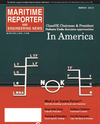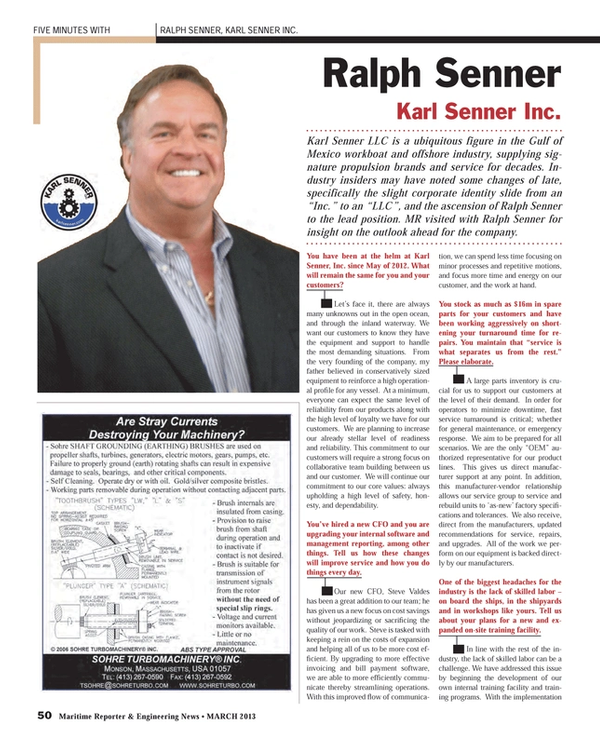
Profile: Ralph Senner, Karl Senner Inc.
Karl Senner LLC is a ubiquitous figure in the Gulf of Mexico workboat and offshore industry, supplying signature propulsion brands and service for decades. Industry insiders may have noted some changes of late, specifically the slight corporate identity slide from an “Inc.” to an “LLC”, and the ascension of Ralph Senner to the lead position. MR visited with Ralph Senner for insight on the outlook ahead for the company.
You have been at the helm at Karl Senner, Inc. since May of 2012. What will remain the same for you and your customers?
Let’s face it, there are always many unknowns out in the open ocean, and through the inland waterway. We want our customers to know they have the equipment and support to handle the most demanding situations. From the very founding of the company, my father believed in conservatively sized equipment to reinforce a high operational profile for any vessel. At a minimum, everyone can expect the same level of reliability from our products along with the high level of loyalty we have for our customers. We are planning to increase our already stellar level of readiness and reliability. This commitment to our customers will require a strong focus on collaborative team building between us and our customer. We will continue our commitment to our core values: always upholding a high level of safety, honesty, and dependability.
You’ve hired a new CFO and you are upgrading your internal software and management reporting, among other things. Tell us how these changes will improve service and how you do things every day.
Our new CFO, Steve Valdes has been a great addition to our team; he has given us a new focus on cost savings without jeopardizing or sacrificing the quality of our work. Steve is tasked with keeping a rein on the costs of expansion and helping all of us to be more cost efficient. By upgrading to more effective invoicing and bill payment software, we are able to more efficiently communicate thereby streamlining operations. With this improved flow of communication, we can spend less time focusing on minor processes and repetitive motions, and focus more time and energy on our customer, and the work at hand.
You stock as much as $16m in spare parts for your customers and have been working aggressively on shortening your turnaround time for repairs. You maintain that “service is what separates us from the rest.” Please elaborate.
A large parts inventory is crucial for us to support our customers at the level of their demand. In order for operators to minimize downtime, fast service turnaround is critical; whether for general maintenance, or emergency response. We aim to be prepared for all scenarios. We are the only “OEM” authorized representative for our product lines. This gives us direct manufacturer support at any point. In addition, this manufacturer-vendor relationship allows our service group to service and rebuild units to ‘as-new’ factory specifications and tolerances. We also receive, direct from the manufacturers, updated recommendations for service, repairs, and upgrades. All of the work we perform on our equipment is backed directly by our manufacturers.
One of the biggest headaches for the industry is the lack of skilled labor – on board the ships, in the shipyards and in workshops like yours. Tell us about your plans for a new and expanded on-site training facility.
In line with the rest of the industry, the lack of skilled labor can be a challenge. We have addressed this issue by beginning the development of our own internal training facility and training programs. With the implementation of this new facility, we aim to steepen the learning curve and broaden the skill set in a shorter amount of time. Leading this effort is one of our most valued, long-term employees, David Hauser. With more than 35 years of technical experience, David has extensive understanding of all Karl Senner LLC products, as well as their interaction in the dynamic system of the driveline. The training program will include comprehensive and practical courses specializing in all Karl Senner, LLC products. The courses will range from general safety and standard overhauls to complex troubleshooting of the entire driveline. The curriculum will be primarily targeted at Karl Senner LLC- service technicians, but additional courses will also be available for operators. We hope that owner/operators take the opportunity to send members of the crew to attend abridged courses focused on the specific equipment that they will be operating. Graduates of the courses should leave with a good understanding of equipment fundamentals and the ability to service the exterior of the units, as well as a comprehensive foundation for troubleshooting the entire driveline.
You are also developing curriculum for your training center, both in terms of skills, but also safety. Tell us about Steve Fisk, why you chose him and what he is developing in-house.
Safety has always been an important area of focus at KS, but in order to fulfill customer requirements for today’s demanding reporting and auditing needs, we have decided to proactively formalize our program, and take it to the next level of hazard mitigation, situational awareness, and process and project documentation. We have brought aboard Steve Fisk (Manager Safety, PP&E) as another great new addition to our team. Steve comes to us from DuPont, where he most recently managed high hazard process safety and product stewardship for the Chlorinated Elastomers product lines. Steve brings 18 years of industrial Safety Protocol/Procedure knowledge to our office and to the field. We anticipate a push from customers to perform safety audits on their vendors, and aim to be prepared before these requirements are in effect. We are implementing a continual improvement mechanism that will ultimately provide a safer environment for our customers, our team and those working around us.
The Safety curriculum will be composed of core principles and task specific directives. Employees will be exposed to several different training delivery styles in order to increase retention and encourage ownership of safe work practices. Written policies, graphical presentations, hands on training and practice, and documented testing and skill demonstrations will all be used to give employees the tools and knowledge needed to perform their tasks in a safe and secure manner. The KS training center is currently under construction and we hope to have the center fully operational by the end of the second quarter of this year.
Are there other plans to modernize and expand facilities and equipment?
Alongside the training facility we are building a tool center where we can better manage the use and condition of tools in the field. Job-specific tools and instruments will be kitted and kept in top condition and regularly inspected, so they are ready for use. Upon completion of the training facility and tool center, we have already planned to upgrade our Parts and Service Department offices. Sometime in the first half of 2013, we plan to install a new test bench for gearboxes, Z-drives and CPPs to check functionality, and affirm overhauled equipment is ready for duty. And our long-term renovation plan focusses on a new on-site Service Center using higher hook-heights and larger cranes allowing us to work on even larger equipment and reduce risks.
Talk about the importance of having test equipment local, on site.
The new test bench will primarily be used for KS ‘serviced’ equipment, as all new equipment has already been tested at their respective factories. The test bench will allow us to start-up and run serviced equipment at our facility to monitor operating conditions, loads and potentially R&D experiments. This will further assure our customers that the equipment as delivered is free of faults and ready for immediate reliable service.
You said the business of propulsion was evolving from a fixed pitch approach to that of a DP / Z-drive mentality. How has that changed your business?
We have been seeing the gradual rise in DP demand every day; more and more contractors are requiring DP capability. From our perspective, CPP and/or Z-drive applications are the best solutions for maneuverability in DP mode. However, we have also been successful in delivering Reintjes Reverse Gearboxes for fixed pitch applications, together with BERG Thruster Units for DP 1- a system that has been working flawlessly.
Steerprop
Steerprop CRP (Counter Rotating Propellers) units in particular are 10-15% more efficient than conventional drives of the same rating. The CRP is a proven, high-efficiency drive system that yields a substantial reduction in NOX emissions. And, with improved maneuverability and higher blade area ratios, these units dramatically reduce noise and vibrations by nearly eliminating cavitation.
Berg
Berg – CPPs have come a long way since the conventional push-pull rods. Berg’s revolutionary design for the CPP units features full feathering with full astern. The circulating hub-oil system assures clean oil is always where it’s needed most. The ability to drain water in case of a seal breech is another advantage of situational awareness. In addition to the CPPs, Berg also offers a quite robust bow thruster, designed for continuous maximum duty through 30,000 hours, with TBOs exceeding 30,000 hours.
Reintjes
Reintjes gearboxes, with their high-reliability/high-efficiency design, along with many available options for PTOs/PTIs, make them a very versatile component of any power distribution system.
Read Profile: Ralph Senner, Karl Senner Inc. in Pdf, Flash or Html5 edition of March 2013 Maritime Reporter
Other stories from March 2013 issue
Content
- Oceanex Is Building Innovation page: 24
- USCG page: 32
- Thad Allen at the Helm page: 32
- Vessel Specific Training Via Adaptive Learning Experience page: 34
- Mass Maritime’s Manned Model Shiphandling Program page: 38
- Shipbuilding: DDW's Future is Bright page: 42
- Adances in Marine Coatings & Corrosion Control page: 46
- Software Solutions Debuts & Upgrades page: 48
- Profile: Ralph Senner, Karl Senner Inc. page: 50


